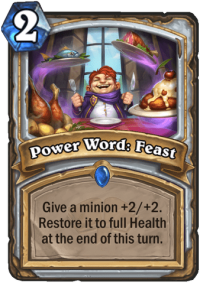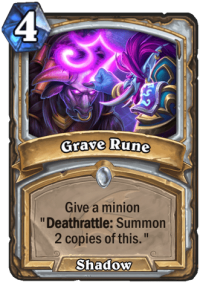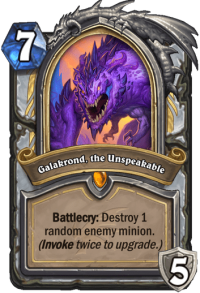Our budget Tempo Priest deck list & guide for the Scholomance Academy expansion will teach you how to play this budget list. This guide includes Mulligans, Gameplay Strategy, Card Substitutions, and Combos/Synergies!
Introduction to Budget Tempo Priest

Tempo Priest is a really interesting build. It’s probably one of the most attempted decks that never actually worked. Players are trying to build it basically every expansion, but as far as I remember it has never gotten a mainstream competitive attention. Some players have thought that things will be different in Scholomance Academy, that they will finally find the “unicorn” build – but no, as it turned out, so far the deck isn’t looking that great. Yes, it has got quite a few solid tools, such as Frazzled Freshman or Power Word: Feast, but all of that is still not enough to beat the current meta.
However, sadly, for those of you who play on the budget – it’s your only option. Galakrond Priest is even worse on the budget, while Highlander Priest is straight up impossible to build without Legendaries (because they’re the only reason you run Highlander in the first place). That’s also the reason why I wouldn’t try to upgrade it too much – use the cards you already have, but don’t craft it. If you want to play Priest, there are better options.
Check out Hearthstone Budget Decks & Guides for All 10 Classes!
Budget Tempo Priest Deck List
Budget Tempo Priest Mulligan Guide
Higher Priority (Keep every time)
- Imprisoned Homunculus – A really solid card for the deck, it’s a great 1-drop even though it doesn’t appear on the board immediately. But once it spawns on Turn 3, you have a big minion you can immediately buff etc. and since it has Taunt, it protects the rest of your board.
- Frazzled Freshman – Another 1-drop – the first vanilla 1 mana 1/4 in the game (Blizzard is really pushing it). Great buff target.
- Power Word: Feast – A really key card in the deck – it lets you buff a minion up, trade into something and then heal it back to full. What’s even better its the synergy with “Injured” minions.
- Sethekk Veilweaver – Just a solid 2-drop in a deck with multiple buff cards – it’s quite easy to get value out of it, and you might force your opponent to use some removals he normally wouldn’t want to use on a 2-drop.
Lower Priority (Keep only if certain conditions are met)
- Power Word: Shield – Keep with Sethekk – not only you cycle it into a random Priest card, but make your 2-drop a 2/5, which is quite hard to remove on T2.
- Injured Tol'vir – Keep with Power Word: Feast – those two have an amazing synergy.
- Dragonmaw Overseer – Keep with Imprisoned Homunculus – it’s a very powerful combo. When Homunculus wakes up, you drop Overseer and buff it up to 4/7, also significantly increasing the chance of Overseer surviving.
Budget Tempo Priest Play Strategy
The deck is based heavily on minions – it’s all about sticking something to the board, then buffing / copying it to the point at which your opponent can’t deal with them. Your buffs are really efficient and if things work out right, you can really do some crazy plays. However, that’s also the deck’s main downside – you really need minions to stick to the board to do anything. You can in theory play a minion and buff it on the same turn, but now if it dies, you’ve got 2 for 1’d, which combined with a quite limited way to cycle through the deck leads to your opponent quickly outvaluing you.

Some of the strongest combos you can do early involve Power Word: Feast. The card works really nicely in the deck. The best way to use it is to play it on an Injured minion – Injured Tol'vir, Injured Blademaster. Those are naturally damaged, so they will get healed back to full at the end of turn, creating either a 4/8 minion with Taunt or a 6/9 minion with no other effect. But just playing a PW:F on a minion, killing something with it (after making sure it survives) and then healing it back to full is quite solid.
Another way to win some games is sticking one of your key minions to the board and not letting your opponent kill it. The first one is Sethekk Veilweaver – this one is a solid value generator. With 12 spells that can target minions present in the deck, it can generate a lot of value while also buffing your board – not to mention that the cards it generates can also sometimes be used to activate its effect, further cycling everything. The second minion is Dragonmaw Overseer – while its body is only 2/2 (making it quite easy to kill), it also gives +2/+2 to a random minion every turn. That’s a really powerful snowball effect, which becomes even better if you copy it. However, it hitting a minion twice or thrice is often good enough to put the opponent in a rough spot. I’ve already mentioned it in mulligan, but the card works really well with Imprisoned Homunculus – having a guaranteed good target on curve is making your life so much easier.

And finally – copy shenanigans. Grave Rune is a really cool card to play on some of your minions, including Dragonmaw Enforcer and Injured minions (which come out at full health when they’re resummoned). The card also protects your board from AoEs – after your opponent drops one, you still have some board presence left. However, the best combo is Grave Rune on Turn 4 into Psyche Split on Turn 5. That will summon an extra copy of the minion with Grave Rune attached, making things really, really awkward for the opponent. He probably wants to kill them, because you’re buffing them and dealing lots of damage – but killing them just summons more copies.
Oh yeah, you also run Inner Fire, but it’s not really in a “combo” way like it was back when Divine Spirit was still in Standard. Your minions tend to have a higher health than attack + you run a few health buffs (e.g. Beaming Sidekick, Power Infusion) which can turn some minions into solid threats. For example, a Turn 1 Frazzled Freshman into Turn 2 Beaming Sidekick + Innervate can be a surprisingly effective way to quickly close out the games. Most of the decks aren’t really equipped to deal with a Turn 2 6/6 minion.
As for the refill – there’s the Sethekk I’ve mentioned, but also Voracious Reader. The deck has quite a low curve, so you can use it to draw a few cards. It’s not optimal, it works better in more aggressive decks, but you don’t really have a lot of options to choose from.
Future Card Replacements for Tempo Priest
Here’s an example full Tempo Priest build you can work towards:
- 0Budget Tempo Priest Deck List & Guide (Scholomance Academy)2
- 1Frazzled Freshman2

- 1Imprisoned Homunculus1

- 1Inner Fire1

- 1Power Word: Shield2

- 1Renew1

- 2Power Word: Feast2

- 2Sethekk Veilweaver2

- 3Apotheosis2

- 3Dragonmaw Overseer2

- 3Mindflayer Kaahrj1

- 3Mindrender Illucia1

- 4Grave Rune1

- 5Psyche Split2

- 7Soul Mirror1


However, like I’ve mentioned in the introduction – you probably should not. Unless you REALLY like this kind of play style and don’t care that much about your win rate, you should go for a different deck instead once you get some Dust. I recommend adding whatever cards you already have (e.g. Devout Pupil – if you own it, add it), but the deck is too weak to be worth your Dust as long as you want to win.
Instead of Tempo Priest, once you get some Dust, I would recommend playing either a Highlander Priest or Galakrond Priest – those two decks work so much better currently. Highlander Priest is most likely better, but it’s also more expensive. You could build a Galakrond deck with just a couple of Epics & Legendaries, which means that you can play it on semi-budget.
Leave a Reply
You must be logged in to post a comment.









Tempo Priest will hardly work with no consistent card draw to stabilize against board clears, we can argue “But the deck has Voracious Reader in it” but we also have buffs and their nature is to be held in hand to target some good minion, which the deck doesn’t have except maybe for Devout Pupil.
You are right for the most part. However, the deck has plenty of good minions to buff. The issue is sticking them to the board. Most of the buff spells cost 3 or more which makes playing a minion and buff simultaneously quite expensive. And if you lose the minion then you are screwed. That’s also the reason why Voracious Reader isn’t really all that helpful. Sometimes you draw a bunch of buff spells and your hand gets clogged with a bunch of stuff you can’t play and that makes Reader really awkward from time to time. I just got Disciplinarian Gandling from the Felosofy bundle so i’m gonna try to build the deck around him (with cards like Serpent Egg and Loot Hoarder) and see how it goes but i don’t have much hope for this archetype.